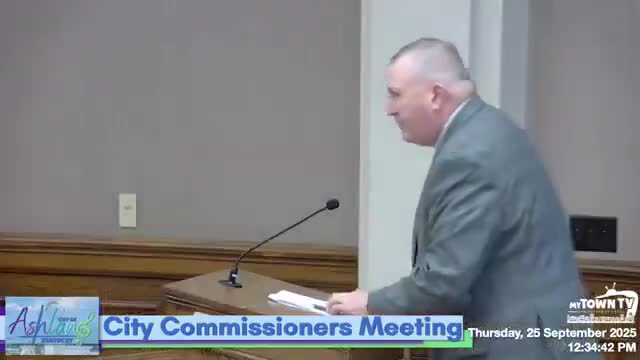Ashland approves studies, grant applications to address PFAS and wastewater upgrades
September 26, 2025 | Ashland, Boyd County, Kentucky
This article was created by AI summarizing key points discussed. AI makes mistakes, so for full details and context, please refer to the video of the full meeting. Please report any errors so we can fix them. Report an error »

Ashland commissioners on Sept. 25 approved a professional-services agreement for a carbon-feasibility study to evaluate treatment for PFAS in the city’s drinking water source and authorized applications and agreements to seek state and federal funding for water and wastewater projects.
Why it matters: The decisions aim to prepare the city for a federally driven limit on PFAS — so-called “forever chemicals” — and to secure outside funding for costly water-system upgrades and lead-service-line work.
Commissioners authorized a contract with Hazen and Sawyer not to exceed $129,410 to complete a feasibility study on using powdered activated carbon to remove PFAS from source water taken from the Ohio River. A staff member told the commission the division of water has already performed jar testing and sampling and that the feasibility work will determine location, feed rates and whether powdered activated carbon is the appropriate technology. The staff member said a 2029 compliance date exists but noted there is a belief the Environmental Protection Agency may push that date to 2031.
Separately, the commission approved a municipal order to submit an application to the Appalachian Regional Commission seeking $2,000,000 for wastewater-treatment-plant improvements. Commissioners also approved a resolution authorizing an assistance agreement with the Kentucky Infrastructure Authority for up to $874,130 in loan funds for an Ashland lead-service-line inventory and assessment project (project F24-056L).
Officials said some of the feasibility work already completed by the division of water may offset the study cost. A staff member also stated it is “very possible” the Hazen study or subsequent work could be reimbursed through KIA.
Discussion vs. decision: Commissioners voted to move forward with the feasibility study and to submit the ARC and KIA applications; no final construction or procurement decisions were made in this meeting.
Next steps: Staff will receive the Hazen & Sawyer study scope and, if funded, return with specifics on recommended treatment or alternative approaches and funding timelines.
Why it matters: The decisions aim to prepare the city for a federally driven limit on PFAS — so-called “forever chemicals” — and to secure outside funding for costly water-system upgrades and lead-service-line work.
Commissioners authorized a contract with Hazen and Sawyer not to exceed $129,410 to complete a feasibility study on using powdered activated carbon to remove PFAS from source water taken from the Ohio River. A staff member told the commission the division of water has already performed jar testing and sampling and that the feasibility work will determine location, feed rates and whether powdered activated carbon is the appropriate technology. The staff member said a 2029 compliance date exists but noted there is a belief the Environmental Protection Agency may push that date to 2031.
Separately, the commission approved a municipal order to submit an application to the Appalachian Regional Commission seeking $2,000,000 for wastewater-treatment-plant improvements. Commissioners also approved a resolution authorizing an assistance agreement with the Kentucky Infrastructure Authority for up to $874,130 in loan funds for an Ashland lead-service-line inventory and assessment project (project F24-056L).
Officials said some of the feasibility work already completed by the division of water may offset the study cost. A staff member also stated it is “very possible” the Hazen study or subsequent work could be reimbursed through KIA.
Discussion vs. decision: Commissioners voted to move forward with the feasibility study and to submit the ARC and KIA applications; no final construction or procurement decisions were made in this meeting.
Next steps: Staff will receive the Hazen & Sawyer study scope and, if funded, return with specifics on recommended treatment or alternative approaches and funding timelines.
View full meeting
This article is based on a recent meeting—watch the full video and explore the complete transcript for deeper insights into the discussion.
View full meeting
